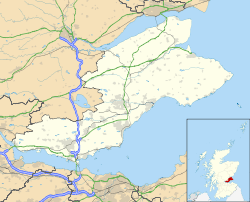Carnock
Coordinates: 56°05′02″N 3°32′24″W / 56.084°N 3.540°W
Carnock is a village located in Fife, Scotland, approximately 4 km (2.5 mi) northwest of Dunfermline and 1 mile east of Oakley, Fife. The village is said to be named for St. Cearnock, a disciple of St. Ninian. Alternatively the form may derive from Caer-cnoc, the meaning of "Caer" to be a fort or castle and "cnoc" which is known to mean an isolated hill (see History of Dunfermline). Carnock is known to have had military significance in antiquity.
Notable places
On the Main Street of Carnock lies a Parish church which was built in 1840, though in the nearby kirkyard lies the remains of the original 12th church which was rebuilt in 1602.
Nextdoor to the church is Carnock Primary School, this school serves both Carnock and Gowkhall. The school was built in 1864 with an extension added in 1912 and another in 2007. The main building consists of 4 classrooms and a medway hut used for various purposes.
On Main Street is The Carnock Inn, inside there is restaurant and bar. Facilities are available for playing Pool or Darts. The pub is often used for parties or celebrations by schools or the locals. Next door is the village Post Office, although this is currently closed and may not re-open.
The village also boasts a Community Centre built in 2005 and available for hire via Fife council.
History
In 1774 upon Carneil hill, near Carnock, several urns containing Roman coinage were discovered. It is believed that the local inhabitants, the Horestii, unsuccessfully defended this location against the Roman general Gnaeus Julius Agricola. the local names Easter Camps and Wester Camps are suspected to originate from this time. Another native fort location is located at the nearby Craigluscar only 2 miles away. Subsequent Roman encampments are suspected 3 miles east of Dunfermline and a large camp at Loch Ore.
The Church in Carnock was held from 1592–1645 by the ecclesiastical historian John Row. Latterly the parish was overseen by Thomas Gillespie from 1741–1752. Thomas Gillespie was founder of the Relief Synod which was latterly incorporated into the United Presbyterian Church.
Transport
The village has two bus stops.
- Eastbound Traveline Code : 34325459
- Westbound Traveline Code : 34325439
Services run from Dunfermline bus station serving Gowkhall, Oakley and Saline, Fife.
| Wikimedia Commons has media related to Carnock. |
